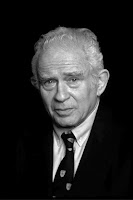Two Great American Novelists Die
 Norman Mailer died of acute renal failure on November 10 at the age of 84. Mailer was the author of more than 30 books and the co-founder of the alternative New York newspaper The Village Voice. Mailer was a regular column writer for the paper.
Norman Mailer died of acute renal failure on November 10 at the age of 84. Mailer was the author of more than 30 books and the co-founder of the alternative New York newspaper The Village Voice. Mailer was a regular column writer for the paper.His first novel, The Naked and the Dead (1948), was based on his experiences as a rifleman with a reconnaissance platoon during the invasion of Luzon in the Philippines. After the success of this novel, he ditched his previous plans of becoming an aeronautical engineer to attend the Sorbonne in Paris.
At several points in his career, Mailer turned his style of writing to non-fiction narrative—a novel based on real events. An example of this style is his Executioner’s Song (1979), which tells the story of real-life killer Gary Gilmore, the first person to be executed in the United States after the reinstatement of the death penalty in 1976.
In addition to fiction and non-fiction books, Mailer also wrote, directed, and acted in his own films.
 Ira Levin died of natural causes on November 12 at the age of 78. Although he wasn’t as prolific a writer as Mailer, he left no less of an impact on the literary world. His first novel, the mystery A Kiss Before Dying (1953), received rave reviews. It's a murder mystery told in three parts: from the viewpoints of the killer and the dead girl's two sisters as they try to solve her murder. It was awarded the Edgar Allan Poe Award as best first novel in 1953.
Ira Levin died of natural causes on November 12 at the age of 78. Although he wasn’t as prolific a writer as Mailer, he left no less of an impact on the literary world. His first novel, the mystery A Kiss Before Dying (1953), received rave reviews. It's a murder mystery told in three parts: from the viewpoints of the killer and the dead girl's two sisters as they try to solve her murder. It was awarded the Edgar Allan Poe Award as best first novel in 1953.Fourteen years later Levin wrote his most famous novel, Rosemary’s Baby (1967). It's a chilling tale of modern-day Satanism and its power over a young couple in a gloomy New York apartment building. The setting of the novel is based on a similar building that Levin lived in, down to the creepy basement laundry room that he wouldn’t let his wife visit alone.
Levin wrote two more classic chillers, The Stepford Wives (1972) and The Boys from Brazil (1976). His sequel to Rosemary’s Baby, Son of Rosemary, was written in 1997. Levin was also a playwright, penning the popular No Time for Sergeants (1956) and Deathtrap (1979). Ten of Levin’s books were adapted to film.
Links:
For more information on these two authors, visit our Biography Resource Center (library card required)
Comments